Israel Defense Forces Chief of Staff Aviv Kohavi denounced the government’s plan to restructure military authority in the West Bank in a series of interviews published on Friday, days before the end of his term as army chief.
Kohavi issued a stark warning that efforts by the new government to split off parts of the responsibilities from the defense minister would damage the IDF’s command structure and hamper its battle readiness.
In wide-ranging interviews, the military chief also detailed Israel’s ongoing efforts to combat Iran’s nuclear program and efforts to expand control across the region, and the challenge of foiling Palestinian terror.
“The IDF is responsible for everything happening in Judea and Samaria, and that’s how it needs to stay,” Kohavi told the Ynet news site, using the Biblical names for the West Bank.
Get The Times of Israel's Daily Edition by email and never miss our top stories
“There cannot be two commanding authorities there,” said Kohavi, who steps down on Monday. “This is likely to cause damage and harm our readiness for war.”
“The work that the Border Police is doing in Judea and Samaria is excellent and I hope that the situation remains just as it is today. The chain of authority needs to be preserved,” he said, referring to plans to take away control of the force from the Israel Police and to place it under the direct control of National Security Minister Itamar Ben Gvir.
The government has also shifted responsibilities from the Civil Administration, the part of the Defense Ministry which manages daily life in the West Bank, to Smotrich.
Specifically, Smotrich’s role as a minister within the Defense Ministry ostensibly allows him to appoint the generals leading the hybrid civil-military Coordinator for Government Activities in the Territories and its office overseeing many settlement issues, the Civil Administration, subject to Netanyahu’s approval.
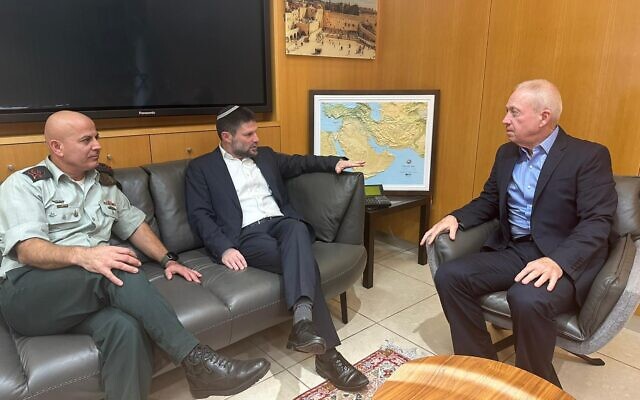
Finance Minister Bezalel Smotrich (center), Defense Minister Yoav Gallant (right), and COGAT head Maj. Gen. Ghassan Alian (left) hold a meeting at the Defense Ministry in Tel Aviv, January 12, 2023. (Courtesy)
Currently, the major general in charge of COGAT is appointed by the defense minister at the recommendation of the IDF chief of staff, and the brigadier general overseeing the Civil Administration is appointed by the IDF chief of staff.
Smotrich reacted angrily to Kohavi’s criticism, accusing him of “populism” and laying the groundwork for a future in politics.
“If Kohavi wanted to understand and not just attack with populism in preparation for his entry into the political field, he could have talked to me and understood that the goal is not to harm the IDF’s chain of command but to remove the Civil Administration from the IDF and make it civilian,” Smotrich tweeted Friday.
“The IDF will deal with security and a civilian system will manage civilian life. Good for the citizens and good for the IDF,” he said.
“Kochavi is confused and forgot that Israel is a country that has an army and not an army that has a country. The responsibilities were transferred to me by law and I am convinced that his successor and the rest of the IDF commanders will act in accordance with the law,” Smotrich said.
Kohavi will have to face a three-year cooling-off period before he is allowed to enter politics as most of his predecessors have done.
In his interviews, Kohavi also addressed criticism of his phone call to Prime Minister Benjamin Netanyahu in which he laid out his opposition to the moves. Critics accused him of meddling in politics.
Kohavi held a phone call with Netanyahu earlier in January, reportedly telling him that the handing of IDF-related responsibilities to any minister other than the defense minister was an unacceptable breach of the IDF chain of command and that he was determined to ensure that the military does not allow it to happen.
In his interview, Kohavi also described another phone call with Netanyahu shortly before the new government took power.
“I thought it was correct when it was known who would be the next prime minister, and before agreements on issues that have significant and deep consequences on the role of the IDF and its values, that the prime minister and relevant people hear our opinion, my opinion, to present the consequences to them,” Kohavi told Channel 12.
“There’s nothing political about it. It’s what is expected from an IDF chief in a situation like this,” he said. “We presented our reasons and considerations and since there is a lot of reason and a strong base to them, I think they will take it seriously into account.”
Kohavi steps down as IDF chief on January 16 and will hand over the reins to Herzi Halevi.
In his interview with the Walla news site, Kohavi also addressed his clash with some right-wing politicians after the IDF’s disciplining of a soldier who taunted a left-wing activist in the West Bank city of Hebron in November.
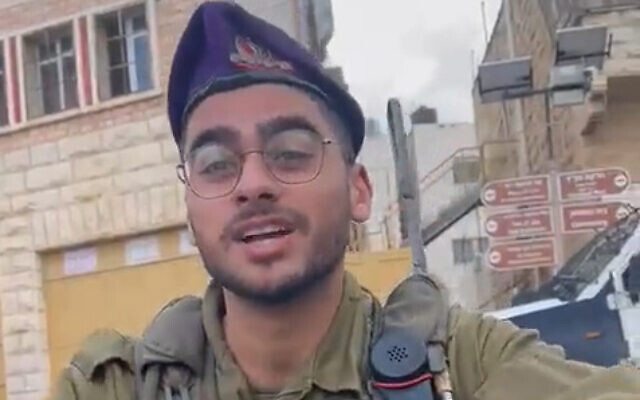
A Givati soldier is seen confronting an activist in the West Bank city of Hebron, November 25, 2022. (Screenshot: Breaking the Silence)
“This is the role of the IDF commanders and myself as the army commander — to define the professional and moral compass, that’s the right thing to do and that’s how it will happen, I suppose, the next time it happens.”
Iran and Hezbollah
Beyond dealing with internal political issues, Kohavi said the military’s biggest challenge remained Iran and preventing it from acquiring nuclear weapons.
Kohavi told Walla that a potential attack on Iran’s nuclear facilities was the “main task” faced by the army, and vowed that “the IDF would be ready to carry out its mission on the day of the order.”
In light of the growing uncertainty regarding a return by Iran to the 2015 nuclear deal with Western powers, the past two years have seen the IDF ramp up efforts to prepare a credible military threat against Tehran’s nuclear sites.
Israel has been pushing for the US to prepare military contingency plans in order to prevent Iran from obtaining a nuclear weapon. Biden has said he is prepared to use military force if necessary but still prefers to exhaust the diplomatic route first.
Asked what would happen if the United States did not join Israel in such a strike, Kohavi said that “Israel must have the capability to perform this operation, also if it means we act alone.”
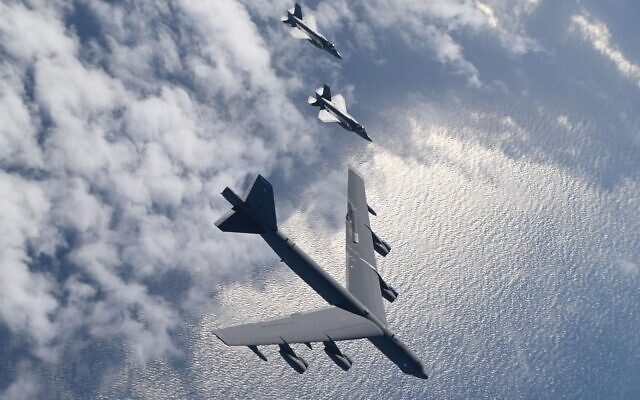
Israeli F-35 fighter jets escort an American B-52 bomber through Israeli airspace on November 10, 2022 (Israel Defense Forces)
Kohavi told Ynet that he opposed the 2015 deal because it would have allowed the Iranians to possess unlimited amounts of enriched uranium at limited purity levels and run advanced centrifuges after 2031.
“The connection between these two things would have allowed them within weeks to be able to reach an amount of nuclear material that would be enough to assemble a bomb,” he claimed.
“If signed, a new agreement cannot have expiry dates. This time it will need to also include oversight on its weapons collection and ballistic missile development,” he added.
In the interviews, Kohavi said that the IDF was working to prevent the transfer of precision weapons to the Iranian-backed Hezbollah terror group in Lebanon, and promised that the IDF would be prepared for an escalation on the northern border.
“We have quite a few successes. They aren’t 100%. On the day of the war, we have ways to hit the few missiles Hezbollah managed to place or build,” he told the Walla news site.
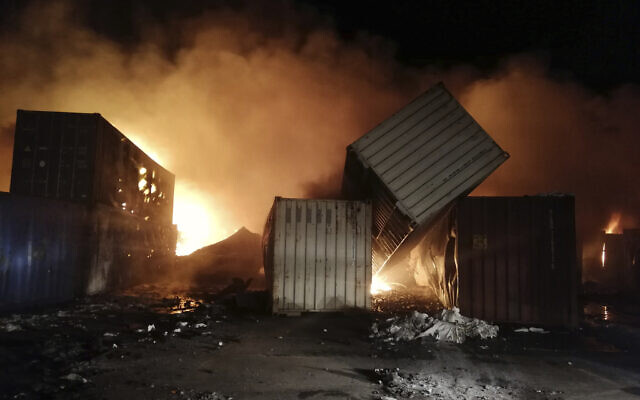
In this photo released by the Syrian official news agency SANA, flames rise from containers at the scene of a missile attack, at the seaport of the coastal city of Latakia, Syria, early Tuesday, Dec. 28, 2021. (SANA via AP)
Kohavi also warned of a powerful retaliation if Hezbollah decided to attack, in his interview with the Israel Hayom daily: “If they carry out a strike at a level of 3 on a scale from 1 to 10, we would respond with a level of 7-8. This is what we planned.”
Kohavi also described the IDF’s success in preventing Iran from gaining a significant foothold in Syria. Israel has allegedly carried out hundreds of strikes on targets inside Syria in recent years, but rarely acknowledges or discusses such operations. It has acknowledged, however, that it targets arms shipments and posts of Iran-allied groups, such as Lebanon’s terrorist Hezbollah.
“Iran’s vision in Syria was completely disrupted. There was supposed to be an array of hundreds of thousands of ground and air missiles, alongside tens of thousands of militias parallel to Hezbollah in a new format in the Syrian Golan,” he told the Maariv daily, adding that the military also disrupted efforts to smuggle weapons from Iran into Syria.
Preventing terror in the West Bank and Gaza
In the interviews, the outgoing military chief discussed the ongoing operation which aims to fight terrorist elements in the West bank following a series of Palestinian attacks that killed 31 people in 2022.
The IDF’s operation has netted more than 2,500 arrests in near-nightly raids. It also left more than 170 Palestinians dead in 2022, and another nine since the beginning of the year, many of them while carrying out attacks or during clashes with security forces, though some were uninvolved civilians.
“We prevented around 400 terror attacks, and those we didn’t, we are investigating,” he told Ynet.
“In contrast to the past, there are no terror groups behind these attacks, instead they are lone-wolf terrorists. It comes from a deep frustration of Palestinian Authority citizens, because of their economic situation, and some of them find a way to vent through terrorist attacks,” he explained.
Kohavi outlined a three-pronged approach to boosting security, including “strengthening the West Bank security barrier and forces along the seam zone area, internal activities along roads and settlements, and the most important — deep offensive operations, round the clock, based on excellent intelligence from the Shin Bet, Military Intelligence, and penetration into the deepest places with the uprooting of the terrorists from them.”
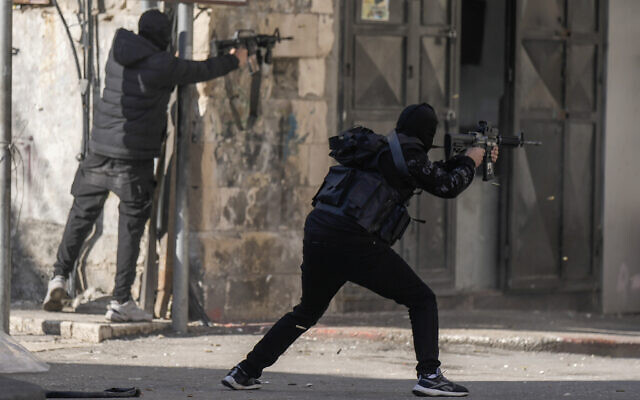
Masked Palestinian gunmen fire during clashes with Israeli security forces in the West Bank city of Nablus, December 30, 2022. (AP/Majdi Mohammed)
In regards to the southern front, Kohavi hailed the IDF’s operations against terrorist infrastructure, in particular Hamas’s tunnel system during Operation Guardian of the Walls in 2021.
“There is a potential for the [current quiet] reality created in the Gaza Strip to last a long time, but this depends on what happens on other fronts, at the Temple Mount, in Judea and Samaria,” he told the Maariv daily.


